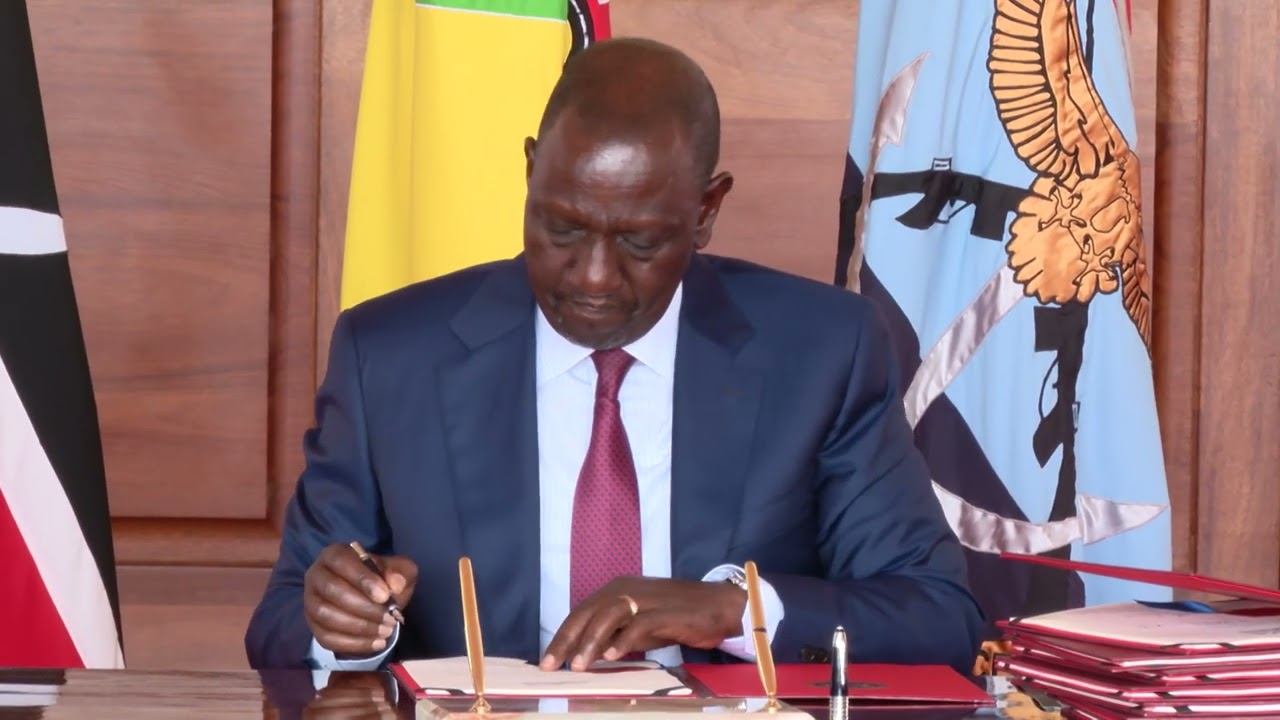
Ruto signs govt spending plan for budget cycle starting July 1 » Capital News
NAIROBI, Kenya, June 25 — President William Ruto has signed into law the Appropriations Bill 2025, authorizing the government to spend Sh1.88 trillion from July 1 to finance priority programs across key sectors including health, agriculture, infrastructure, and security.
The new law signed on Thursday gives the National Treasury the mandate to draw Sh1.88 trillion from the Consolidated Fund for recurrent and development expenditure in the 2025/26 financial year, and an additional Sh672 billion in Appropriations-in-Aid from revenues collected by ministries, departments, and agencies.
The spending plan, anchored on the Bottom-Up Economic Transformation Agenda (BETA), allocates Sh1.8 trillion for recurrent expenditure and Sh744.5 billion for development, aiming to stimulate inclusive growth and deliver on the government’s flagship commitments.
To strengthen food security and reduce reliance on imports, the government has allocated Sh47.6 billion to the agriculture and food security sub-sector including interventions on value chain development (Sh10.2bn) and fertilizer subsidy (Sh8bn).
Other funding areas include Sh4bn to write off coffee farmers’ debts and bolster the Revolving Cherry Fund, Sh1.6bn for smallholder livestock commercialization and Sh3.2bn for pastoral economy enhancement.
The government will also spend Sh1.5bn on sugar sector reforms and Sh5.2bn for blue economy interventions.
Health
In a push toward Universal Health Coverage (UHC), the health sector will receive Sh133.4bn, including Sh17.3bn to the Global Fund for HIV, Malaria, and TB.
The government will also provide Sh13.1bn for the Primary Healthcare Fund, Sh8bn for emergency, chronic, and critical illness care, and Sh6.2bn to transfer confirmed healthcare workers to county payrolls.
Treasury will also fund vaccines and immunization to the tune of Sh4.6bn, doctors’ internships (Sh4bn), maternal and child health services (Sh3.8bn), doctors’ CBA (Sh1.75bn) and contruction and equippingof cancer centres (Sh1.3bn).
Other expenditure areas include:
Enterprise
- Sh 1.3 bn to the Rural Kenya Financial Inclusion Programme
- Sh 300 million to the Hustler Fund
- Sh 300 million to the Youth Enterprise Development Fund
- Sh 600 million for the Centre for Entrepreneurship
- Sh 200 million for MSME agricultural credit
These measures aim to improve access to affordable credit and catalyze growth among Kenya’s MSMEs.
Industrialization and Value Addition
The government has earmarked Sh18bn to connect agriculture, MSMEs, and manufacturing through value chain development. Notable allocations include:
- Sh 4.5 bn for County Integrated Agro-Industrial Parks
- Sh 1.1 bn for textile parks in Naivasha and Athi River
- Sh 700 million for Export Processing Zone (EPZ) hubs
- Sh 500 million for Kenya Industrial Estates to support MSME incubation
Security and Infrastructure
In line with national security priorities and economic mobility goals:
- Sh 217.3 bn is set aside for road construction and rehabilitation
- Sh 38.6 bn for rail, sea, and air transport infrastructure
- Sh 62.8 bn to support power generation, grid expansion, and e-mobility
- Sh 12.7 bn for the digital superhighway and creative economy initiatives
Education Sector
With Sh658.4 bn allocated to education, the Bill prioritizes teacher recruitment, scholarships, school feeding, and infrastructure. Key items include:
- Sh 387.8 bn for teacher resource management
- Sh 58.9 bn for free primary and secondary education
- Sh 28.9 bn for junior secondary capitation
- Sh 41.5 bn for university loans via HELB
- Sh 17.3 bn for university scholarships
- Sh 7.7 bn for TVETs
- Sh 3 bn for school meals
- Sh 700 million for school infrastructure